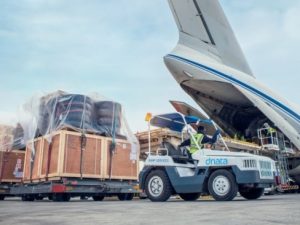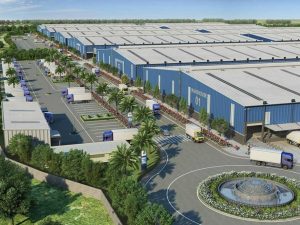Pradeep Panicker, CEO, GHIAL says, “Manufacturing companies are focusing on the China +1 strategy and India’s ‘Make in India’ will be an opportunity to increase its shares of global manufacturing especially technology-related manufacturing by friendly countries. This will immensely benefit the air cargo business in India. New policies and initiatives being implemented by the Government aim to enhance competitiveness, streamline procedures, provide financial assistance, and expand market access for Indian exporters. Export Promotion Schemes, Make-In-India Initiatives, Foreign Trade Policies such as Free trade agreements (FTAs) & preferential trade agreements (PTAs), Single Window Interface for Facilitating Trade (SWIFT), and Export promotion councils are trying to support and promote Indian exports.”
Read More »Softlink Global wins ‘Best Tech Service Provider’ Award
Softlink Global was felicitated with ‘Best Technology Service Provider’ award at recently concluded India Cargo Awards 2023 in New Delhi. Piyush Srivastava, IES, Senior Economic Advisor graced the occasion as the Chief Guest. Known as the “Oscars of the Cargo Industry,” the India Cargo Awards 2023 hosted by Cargo Talk (DDP Group Publication) serves as an all-India platform created with a vision to recognise excellence in the Cargo-Freight-Logistics Industry across various domains, including Rail, Road, Air, Sea, Allied Services, Warehousing, Technology, 3rd Party Logistics, and more. Our world-class awards ceremonies are known for their formal Black-Tie affair, filled with glitz and glamour, attended by the most influential personalities in the Cargo Industry.
Read More »Dnata teams up with Speedcargo to boost tech services at Etihad Cargo
dnata has partnered with logistics technology solutions provider Speedcargo to deliver cutting-edge cargo services to Etihad Cargo at Singapore Changi Airport (SIN). Speedcargo’s artificial intelligence (AI)-based Cargo Eye and Assemble solutions installed at dnata’s facilities will help overall logistical efficiency, digitisation and optimise cargo capacity for Etihad Cargo’s daily flights departing from Singapore. The roll-out of Cargo Eye and Assemble follows the airline’s decision to implement the technology in response to successful trials. Cargo Eye uses advanced, vision-based 3D technology to scan and capture a cargo’s exact dimensions, volume data, images, and labels, providing a comprehensive digital record. This information is then fed into Assemble which creates a digital plan, advising dnata’s highly-trained cargo handling teams of the optimal method of building a pallet. The innovative solutions ensure Etihad Cargo maximises cargo capacity, while becoming more efficient and sustainable. Both Cargo Eye and Assemble seamlessly integrate into dnata’s existing warehouse management system.
Read More »Pact signed to develop 0.7 mn sq. ft. facility in Bhiwandi
Morgan Stanley Real Estate Investing (MSREI), a unit of Morgan Stanley, has partnered with Mumbai-based Prakhhyat Group, to develop a 0.7 million square feet Class A warehousing project at K Square Logistics Park in Bhiwandi near Mumbai. According to sources, it is investing Rs 300 crore in Prakhhyat which will develop the warehousing space. This marks MSREI’s entry in the Bhiwandi sub-market of Mumbai. With this, MSREI has now invested in over 5.6 million square feet of logistics assets across the country, it said.
Read More »‘Partnerships, investments must to cut capacity constraints’
Videh Kumar Jaipuriar, CEO, Delhi International Airport says, “The air cargo sector faces several challenges, each with its corresponding strategic response. Capacity constraints, driven by reduced passenger flight cargo space due to the pandemic, necessitate innovative partnerships and investments. Compliance with complex regulations, especially in security and customs, is maintained through continuous protocol updates. Mitigating volatile fuel costs involves exploring fuel-efficient technologies and sustainable aviation fuels. Economic uncertainty and geopolitical tensions emphasize the diversification of markets and services. Robust contingency plans and risk mitigation strategies counter supply chain disruptions. Talent shortages are tackled via training programs and attractive compensation packages. Security threats demand cutting-edge measures and staff training. Rapid changes in global trade policies are monitored and addressed through advocacy. These challenges, while testing, offer opportunities for innovation, sustainability, technology adoption, and strategic partnerships to fortify industry leadership.
Read More »Kolkata Port offers 60 acres land for state’s first MMLP
Syama Prasad Mookherjee Port (SMP), also known as Kolkata Port is offering nearly 60 acres of its land for the state’s first multi-modal logistics park (MMLP), said official reports. Although there are 6-7 MMLPs proposed across the country to improve logistics infrastructure, none of them is in the port area. This makes the Kolkata project more attractive, as it is just 2km from the dock, the official reports added. “We have invited an e-tender-cum-e-auction for the allotment of the vacant land at Transport Depot Road, Hide Road Extension, and Sonapur Road, on a long-term lease of 30 years for setting up the MMLP. The base annual rent is Rs 21 crore. We have also kept a minimum guaranteed volume of cargo of one million tonne as part of the terms. This will help to attract more port users and benefit the Kolkata port, added reports.
Read More »First Air Cargo from Assam reaches Singapore
Assam has shipped air cargo containing fruits, directly to Singapore for the first time in history. Singapore High Commissioner to India, Simon Wong said in a tweet that this is the first time that “a direct agro-export source” has been established from the Northeast of India to Singapore. The journey only takes 4.5 hours, which is a massive boon to help “double Northeast’s agricultural exports”, said Assam Chief Minister Himanta Biswa Sarma. Previously, the India and Singapore also piloted the first live paperless transaction using the Trade Trust platform, another landmark moment to digitally connect the two nations.
Read More »Enhance trade, network & connectivity to become hub’
Satyaki Raghunath, Chief Strategy and Development Officer, BIAL says, “India’s trade prospects are hindered by inadequate infrastructure such as airports, roadways and logistics facilities. These factors affect the efficiency of cargo movement and trade operations. To become a trade hub, India needs to invest in infrastructure development and modernization, improve connectivity and reduce logistical bottlenecks. Regulatory procedures, such as customs clearance, licensing and documentation requirements are complex and time-consuming, which increases the transaction costs for businesses. To boost air cargo and facilitate smoother trade operations, customs authorities are adopting digital solutions, streamlining and simplifying procedures and implementing single-window clearance systems. These efforts aim to enhance the ease of doing business. However, India still needs significant improvements in infrastructure, especially in transportation and logistics, to become a world cargo and trade hub.”
Read More »CJ Darcl wins ‘Best Multimodal Transport company’ award
CJ Darcl Logistics was felicitated with ‘Best Multimodal Transport & Logistics company’ award at recently concluded India Cargo Awards 2023 in New Delhi. Piyush Srivastava, IES, Senior Economic Advisor graced the occasion as the Chief Guest. Known as the “Oscars of the Cargo Industry,” the India Cargo Awards 2023 hosted by Cargo Talk (DDP Group Publication) serves as an all-India platform created with a vision to recognise excellence in the Cargo-Freight-Logistics Industry across various domains, including Rail, Road, Air, Sea, Allied Services, Warehousing, Technology, 3rd Party Logistics, and more. Our world-class awards ceremonies are known for their formal Black-Tie affair, filled with glitz and glamour, attended by the most influential personalities in the Cargo Industry.
Read More »Concession agreement signed to develop container terminal at Kandla
DP World signed the Tconcession agreement on Friday with Deendayal Port Authority to develop, operate and maintain a new 2.19 million EU per annum Tuna Tekra mega-container terminal at Kandla in Gujarat. The concession agreement was signed between S. K. Mehta, Chairman of Deendayal Port Authority and Rizwan Soomar, MD & CEO, India Subcontinent, Middle East and North Africa, DP World, in the presence of Sarbananda Sonowal, Honourable Minister of Ports, Shipping and Waterways, and Sultan Ahmed Bin Sulayem, Group Chairman and CEO of DP World. The concession to develop the mega-container terminal at Tuna-Tekra was awarded to Hindustan Infralog Private Limited (a joint venture between DP World and National Investment and Infrastructure Fund, India’s collaborative investment platform anchored by the Government of India) in January 2023 by the Deendayal Port Authority, under a Build-Operate-Transfer (BOT) basis for a period of 30 years with an extension option of further 20 years. DP World currently operates five container terminals in India – two in Mumbai, one each in Mundra, Cochin and Chennai – with a combined capacity of approximately 6 million TEUs. With the addition of Tuna Tekra, DP World will have a combined capacity of 8.19 million TEUs.
Read More » Cargo Breaking News
Cargo Breaking News









